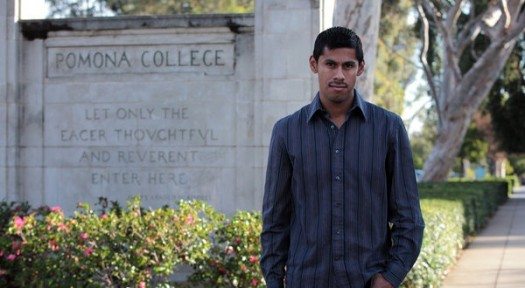

(Note to Our Readers: About a month ago, a multi-year struggle by food service workers at Pomona College finally culminated in victory. The college had resisted their efforts mightily, even firing many workers under the pretext of their immigration statuses. On May 22, Clergy and Laity United for Economic Justice Los Angeles, whose members did much to help win this campaign, honored those workers and their struggle by giving a “Giant of Justice” award to Christian Torres, one of those workers fired by the college. Former UNITE HERE President John Wilhelm gave Christian an absolutely fantastic introduction, and then Christian went and blew John out of the water — as he’d be the first to proudly admit. Christian’s story is a compelling one, both of a struggle to win a union, but also of the struggle of immigrants everywhere. Rather than try and tell it ourselves, we thought best to share his version with you.)
Thank you so much for this;


Now that the L.A. mayoral race is over, its winner, Eric Garcetti, has much to do to help advance an environmental agenda for Los Angeles. He has a strong record of environmental protection and I’m confident that as mayor he can lead the City to a big and bold vision of environmental sustainability. There are several major issues L.A. will need to address during the next four years. A comprehensive report prepared by UCLA serves as a more in depth analysis than this blog can undertake, but here are some of the major issues that Mayor Garcetti should undertake.
Waste
This next year is going to be critical to advancing a future that relies less on landfills and more on reducing, reusing and recycling. Of immediate priority, Eric Garcetti needs to push hard with the City Council to vote on the single-use plastic bag ban ordinance,
» Read more about: The Next Four Years: A Time to Work on the Environment »
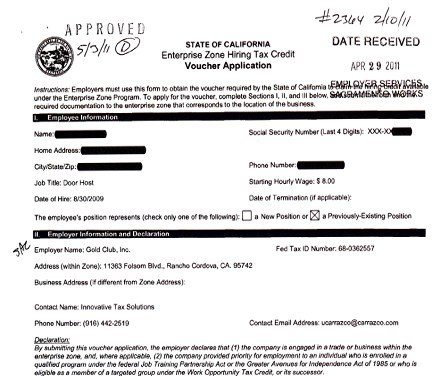

California’s controversial $700 million enterprise zone program has long been shrouded in secrecy. But now Frying Pan News has obtained documents showing that the Rancho Cordova strip club Gold Club Centerfolds has been approved for enterprise zone tax credits. The documents show that the gentlemen’s club has received credits worth up to $37,440 apiece for nine employees — sales associates, door hosts and security officers — who are paid from $8 to $9.25 an hour.
See Gold Club Centerfolds’ tax credit documents here.
The documents reflect only a portion of all approvals for Gold Club Centerfolds. The approvals were granted by Sacramento’s enterprise zone manager and came in 2011. The documents were obtained by the California Labor Federation under a public records request. The labor federation also requested records to see if another Rancho Cordova strip club, Déjà Vu Showgirls, has similarly been approved for tax credits,
» Read more about: In Black and White: Strip Club Approved for Tax Credits »
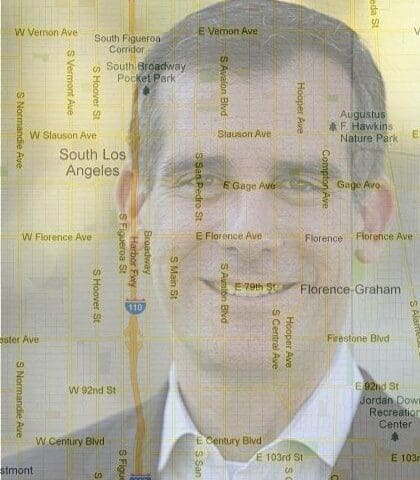
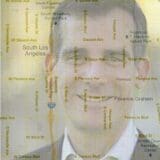
South L.A. is the neediest and most politically challenging part of the city that gets in the news chiefly for the story of its shifting demographics — from mostly black to mostly Latino. Mayor-elect Eric Garcetti’s background fits nicely into that story. He is being touted as the first Jewish mayor, although the heritage he touted openly and often during campaign season was Latino. That’s identity politics, technically, but his win was hardly as landmark a moment as were Tom Bradley or Antonio Villaraigosa’s victories. But it was effective. Garcetti captured a solid majority of the Latino vote — 60 percent. Every elected official in the country and especially in California and Los Angeles is keenly aware of the upward trend of Latino political influence and the need to address it.
Garcetti didn’t really have to do a hard sell because of the Mexican heritage on his father’s side—his great-grandfather was killed during the Mexican Revolution—and he speaks fluent Spanish.
» Read more about: South L.A. Looks With Wary Hope to a New City Hall »


John Thomas and Hans Burkhardt have a lot in common. For more than 17 years each man had a good paying union job, with health and pension benefits, near San Francisco Bay. Thomas worked as a warehouseman for VWR International, a medical supply company with a warehouse in Brisbane, south of Candlestick Park. Burkhardt also worked as a warehouseman, for BlueLinx, a building products company with a facility across the bay in Newark.
The similarities don’t end there. Both Thomas and Burkhardt are now collecting unemployment, having lost their $22-an-hour jobs after their employers moved to take advantage of California’s enterprise zone plan, a controversial state program that is supposed to create jobs.
The enterprise program, established in 1984, provides $700 million in tax breaks for companies that set up business or move to one of 40 zones within the state.
» Read more about: How Enterprise Zones Are Killing the California Dream »


The National Labor Relations Board (NLRB) is facing the greatest crisis in its 78-year history. On Thursday, May 16, the full Senate Committee on Health, Education, Labor and Pensions held a hearing on the president’s nominees — three Democrats, two Republicans — to the National Labor Relations Board. Without swift confirmation of these nominees, the NLRB will soon be reduced to zero members, and for the first time in board history, the president will be unable to appoint members by recess for at least a year. By blocking the nominations, Republicans appear intent on incapacitating the NLRB for much of the president’s second term.
For the past two years, Republicans and anti-union groups have gone all-out to stymie the work of the labor board, and they have found a powerful ally in the D.C. Circuit Court of Appeals. In January, in a decision that would have invalidated hundreds of presidential recess appointments over the past few decades,
» Read more about: Employers’ New BFF: DC Circuit Court of Appeals »


Last month, the Walton Family Foundation, led by heirs to the Walmart fortune, announced an $8 million grant to StudentsFirst, headed by Michelle Rhee, the ousted chancellor of the Washington, D.C. school system. This grant came on top of the $3 million the foundation had already donated to the group since 2010.
Rhee’s tempestuous tenure as head of the D.C. schools between 2007 and 2010 left behind a legacy of alleged cheating on standardized tests, a demoralized teaching staff with high turnover and an increased achievement gap between low- and upper-income children. Soon after she left that job, she started StudentsFirst, which is now based in Sacramento, and has operations in 18 states. It recently donated $350,000 to LAUSD [Los Angeles Unified School District] school board races, backing candidates who support its agenda of high-stakes testing, private charter schools and school vouchers. Nicholas Lemann’s devastating profile of Rhee in the current issue of the New Republic exposes her misguided and hypocritical educational agenda.
» Read more about: Walmart Can Improve Our Schools by Paying Living Wages »


 “This systematic abuse cannot be fixed with just one resignation, or two,” said David Camp, the Republican chairman of the House tax-writing committee, at an oversight hearing dealing with the IRS. “This is not a personnel problem. This is a problem of the IRS being too large, too intrusive, too abusive.”
“This systematic abuse cannot be fixed with just one resignation, or two,” said David Camp, the Republican chairman of the House tax-writing committee, at an oversight hearing dealing with the IRS. “This is not a personnel problem. This is a problem of the IRS being too large, too intrusive, too abusive.”
David Camp has it wrong. There has been a “systematic” abuse of power, but it’s not what Camp has in mind. The real scandal is that:
The IRS has interpreted our tax laws to allow big corporations and wealthy individuals to make unlimited secret campaign donations through sham political fronts called “social welfare organizations,” like Karl Rove’s Crossroads, the U.S. Chamber of Commerce and Priorities USA.
This campaign money has been used to bribe Congress to keep in place tax loopholes like the “carried interest” rule that allows the managers of hedge funds and private equity funds to treat their income as capital gains,
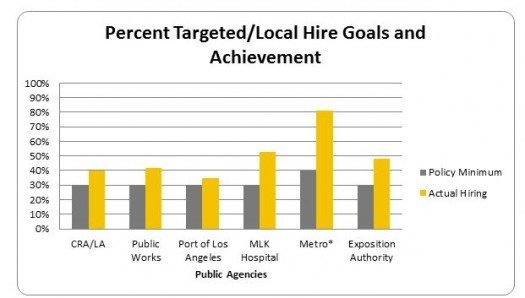
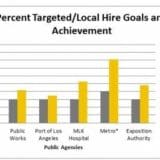
Since 2011, the Construction Careers Coalition has secured agreements with public agencies to bring good jobs and benefits to local community members through public construction projects. These agreements are bearing fruit: At each of the six public agencies, we have exceeded our hiring goals for local residents, which means that more families can support themselves and more money flows back into our local economy.
The coalition has used a key tool, the Project Labor Agreement (PLA), to create public accountability and good middle-class jobs for local residents. A PLA is an agreement between a government agency and construction unions in which both sides offer concessions to ensure that construction work is completed on time and on budget. The Construction Careers Coalition has focused on adding a Construction Careers policy to PLAs here in L.A. as a way to create green infrastructure that employs local people. At each agency,
» Read more about: What Does It Take to Employ L.A.’s Poorest & Most Disadvantaged? »
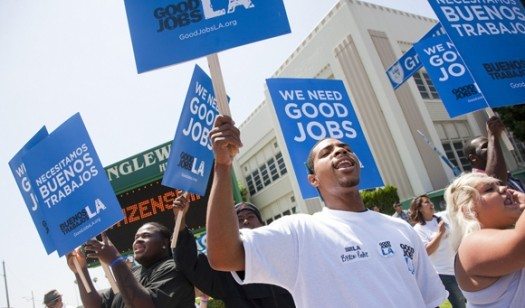
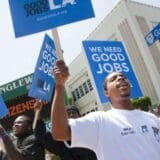
What is the single biggest economic problem facing people early in this century? It is not the budget deficit or national debt. It is the eroding and disappearing of good jobs. People with good jobs – jobs that provide decent pay and benefits and the flexibility to be able to take care of one’s family – are the fuel of the economy and the basis for broadly shared prosperity. Good jobs, and the things that go with them – a good education, affordable health care, and a secure retirement – are the very definition of a successful economy.
The public gets it. When asked to identify “the single biggest problem facing this country today,” 40 percent answered “jobs and the economy.” Number two was “budget deficit/national debt,” at six percent.
Four years after the official end of the Great Recession,
» Read more about: Making “Good Jobs” the New Narrative in Washington »